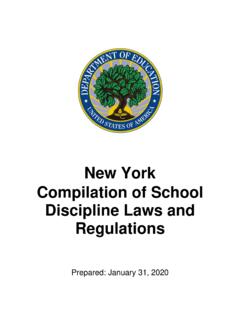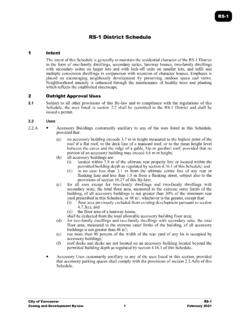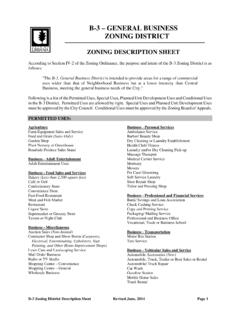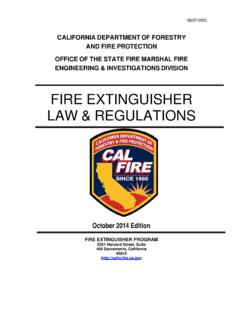Transcription of District of Columbia Tenant Bill of Rights - Washington, D.C.
1 FORM OTA p. 1 District OF Columbia OFFICE OF THE Tenant ADVOCATE District of Columbia Tenant Bill of Rights The Tenant Bill of Rights Amendment Act of 2014 , effective December 17, 2014 ( Law 20-147; Official Code (8) & (b)(1)) requires the Office of Tenant Advocate to publish a Tenant Bill of Rights to be updated periodically and noticed in the Register. This document is not exhaustive and is intended to provide tenants with an overview of the basic Rights of tenancy in the District . Except for rent control, all these Rights apply to every Tenant in the District . 1. LEASE: A written lease is not required to establish a tenancy.
2 If there is one, the landlord must provide you with a copy of the lease and all addendums. The landlord must also provide you with copies of certain District housing regulations , including those for Landlord & Tenant relations. Certain lease clauses are prohibited, including waiver of landlord liability for failing to properly maintain the property. The landlord may not change the terms of your lease without your agreement. After the initial lease term expires, you have the right to continue your tenancy month-to-month indefinitely on the same terms, except for lawful rent increases. (14 DCMR 101, 106 & 300-399) 2.
3 SECURITY DEPOSIT: The amount of the security deposit may not exceed the amount of 1 month s rent. The landlord must place your security deposit in an interest-bearing account. The landlord must post notices stating where the security deposit is held and the prevailing interest rate. If there is a move-out inspection, the landlord must notify you of the date and time. Within 45 days after you vacate the apartment, the landlord must either return your security deposit with interest, or provide you with written notice that the security deposit will be used to defray legitimate expenses (which must be itemized within 30 more days).
4 (14 DCMR 308-311) 3. DISCLOSURE OF INFORMATION: Upon receiving your application to lease an apartment, the landlord must disclose: (a) the applicable rent for the rental unit; (b) any pending petition that could affect the rent (if rent control applies); (c) any surcharges on the rent and the date they expire (if rent control applies); (d) the rent control or exempt status of the accommodation; (e) certain housing code violation reports; (f) the amount of any non-refundable application fee, security deposit, and interest rate; (g) any pending condo or coop conversion; (h) ownership and business license information.
5 (i) either a 3-year history of mold contamination (as defined) in the unit and common areas, or proof of proper remediation; and (j) a copy of this Tenant Bill of Rights document. The landlord must make this information accessible to you throughout your tenancy. Upon a Tenant s request once per year, the landlord must also disclose the amount of, and the basis for, each rent increase for the prior 3 years. ( Official Code & .13(d)) FORM OTA p. 2 4. RECEIPTS FOR RENTAL PAYMENTS: The landlord must provide you with a receipt for any money paid, except where the payment is made by personal check and is in full satisfaction of all amounts due.
6 The receipt must state the purpose and the date of the payment, as well as the amount of any money that remains due. (14 DCMR 306) 5. RENT INCREASES: Rent control limits the amount and the frequency of rent increases. For units that are exempt from rent control, generally only the lease terms limit rent increases. If rent control applies, the landlord may not raise the rent: (a) unless the owner and manager are properly licensed and registered; (b) unless the unit and common areas substantially comply with the housing code; (c) more frequently than once every 12 months; (d) by more than the Consumer Price Index (CPI) for an elderly Tenant (age 62 or over) or Tenant with a disability, regardless of income, if registered with the Rent Administrator; (e) by more than the CPI + 2% for all other tenants.
7 A rent increase larger than (d) or (e) requires government approval of a landlord petition, which tenants may challenge. You also may challenge a rent increase implemented within the prior 3 years. 6. BUILDING CONDITIONS: The landlord must ensure that your unit and all common areas are safe and sanitary as of the first day of your tenancy. This is known as the warranty of habitability. The landlord must maintain your apartment and all common areas of the building in compliance with the housing code, including keeping the premises safe and secure and free of rodents and pests, keeping the structure and facilities of the building in good repair, and ensuring adequate heat, lighting, and ventilation.
8 The Tenant has the right to receive a copy of a notice of violation issued to the landlord (14 DCMR 106; 301; & 400-999) 7. LEAD PAINT HAZARD: For properties built prior to 1978, the landlord must (a) provide a prospective Tenant household with a form issued by the District Department of the Environment about their Rights under the lead laws; (b) provide a current lead-safe clearance report to (i) a prospective Tenant household that includes a child less than 6 years of age or a pregnant woman, (ii) an in-place Tenant household that gains such a person and requests the report in writing from the landlord, and (iii) any Tenant household regularly visited by such a person.
9 And (c) disclose to a Tenant household what the landlord reasonably should know about the presence in the Tenant s unit of a lead-based paint hazard or of lead-based paint, which is presumed to be present unless there is documentation showing otherwise. (20 DCMR 3300 et seq.) 8. MOLD: Upon written notice from a Tenant that mold or suspected mold exists in the unit or a common area, the landlord must inspect the premises within 7 days and remediate within 30 days. Mold assessment and remediation must be performed in compliance with District regulations . ( Official Code 8-241) FORM OTA p. 3 9.
10 QUIET ENJOYMENT AND RETALIATION: The landlord may not unreasonably interfere with the Tenant s comfort, safety or enjoyment of a rental unit, whether for the purpose of causing the housing accommodation to become vacant or otherwise ( Official Code ). The landlord may not retaliate against you for exercising any right of tenancy. Retaliation includes unlawfully seeking to recover possession of your unit, to increase the rent, to decrease services or increase your obligations; and also includes violating your privacy, harassing you, or refusing to honor your lease. ( Official Code ) 10.







